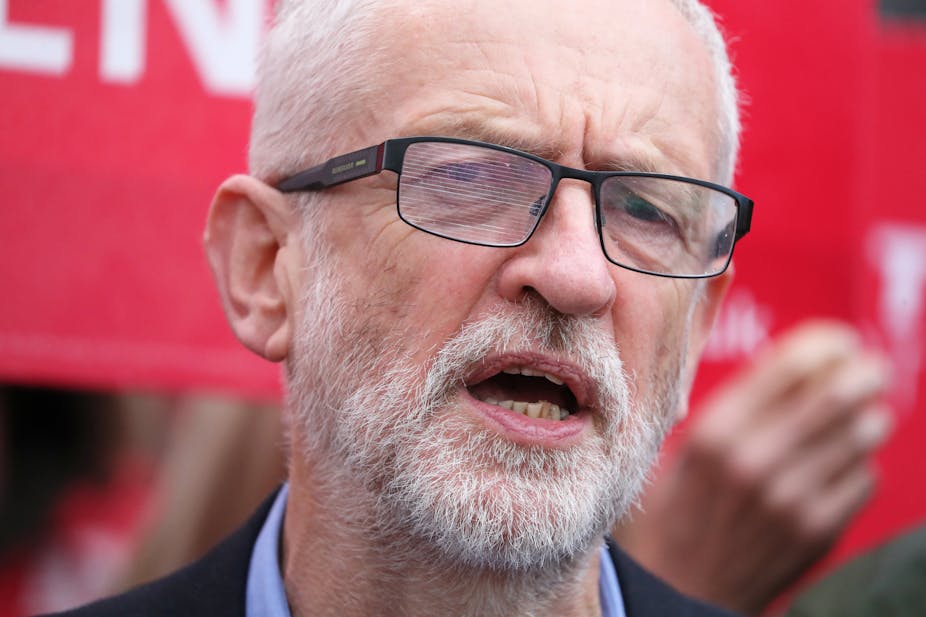The issue of Scottish independence continues to tie the Labour party in knots. Jeremy Corbyn’s pronouncements during a visit to Glasgow are the latest example of Labour’s difficulties in maintaining its traditional role as the party of Scotland’s working classes and liberal intelligentsia – particularly since the 2014 independence referendum.
Asked about a second referendum, the Labour leader initially said he would not agree to one in the first term of a Labour government, “because I think we need to concentrate completely on investment across Scotland”. This appeared to bring him close to Conservative leader Boris Johnson’s “cast-iron pledge” against another Scottish referendum.
Shortly afterwards Corbyn’s aides were clarifying to journalists that this was not a shift from Labour’s previous apparent position, that the party would grant a referendum if the SNP won a majority in the 2021 Scottish election. Corbyn confirmed as much in Hamilton on the next stop of his two-day Scottish tour.

That the Labour leader rowed back on his initial statement speaks to the multi-faced approach that the shifting political dynamics of independence have forced the party to adopt. A variety of statements from senior Labour figures in recent weeks and months have ranged from saying they wouldn’t stand in the way of another indyref to expressing almost outright opposition.
Labour and Scottish independence
So why does independence cause such difficulties for the Labour party? For decades, Labour was Scotland’s dominant political force. A 1979 referendum vote in favour of creating a Scottish parliament was defeated because there were not enough Yes supporters to clear the turnout threshold.
When a “democratic deficit” emerged during the Thatcher era – in which Scotland broadly voted Labour while England voted Conservative – this gave way to a solid commitment from Labour to create a set of Scottish political institutions within the confines of the UK state. Labour’s motives were twofold: a high-minded democratic justification intermingled with a desire to wrongfoot and decisively defeat Scottish nationalism, which had been gaining ground in the 1960s and 1970s.

The idea was that devolution would show Scots that the choice between self-determination and remaining a full member of the UK’s “family of nations” was a false one. Things didn’t exactly pan out that way, however. In the years after the Scottish parliament was finally established by Tony Blair in 1999, the SNP grew in strength and popularity. It took power as a minority government in 2007 and has run Scotland ever since.
Awkward bedfellows
The independence referendum was called following the unexpected election of a majority SNP Scottish government in 2011 – the electoral system of proportional representation in Scotland had been designed by Labour to make it very difficult for this to happen.
The independence campaign placed Labour in the unfamiliar position of arguing against more powers for Scotland. It did so out of conviction, having been a consistent supporter of state centralism and the Westminster system. In the eyes of Scottish voters, the cross-party Better Together campaign put the party in lock-step with UK coalition government leaders David Cameron and Nick Clegg, neither of whom were popular north of the border.
Though Better Together won the referendum with a 55% vote, Labour emerged with little credit, alienating a considerable amount of its traditional voters who had voted Yes. The Conservatives have gained in popularity among No voters, representing a purer expression of British nationhood and traditional unionism. Meanwhile, the SNP have remained the predominant voice of Yes voters. Labour’s more equivocal position – seldom opposed to more powers for the Scottish government, but resolutely opposed to independence – has seen them squeezed from both sides.

It is in this context that Corbyn’s comments must be seen. Corbyn is not just saying no to independence, he is saying no to Scottish self-determination. Rowing back two hours later does not change the fact that he has made it easier for himself and his party to be pigeon-holed as acting as one with the Conservative government on this issue.
This is a mistake. Labour may well be close to finished in Scotland already: it commands only seven of the 59 seats, having had 41 as recently as 2010, and polls were already pointing to new lows this time around.
Corbyn’s apparently harder position may hasten that demise. It doesn’t make it easier for the party that a substantial minority of its voters are in favour of independence. Corbyn’s best way forward was to offer to respect the will of the Scottish people in granting a referendum should its parliament vote for holding one; to accept that Scotland’s strong desire to remain in the EU justifies revisiting the question. Alienating the party’s more doggedly unionist Scottish leadership is a price that Corbyn should have been willing to pay.


